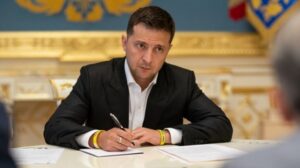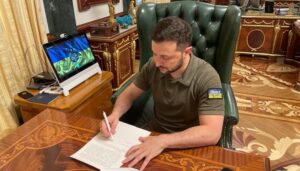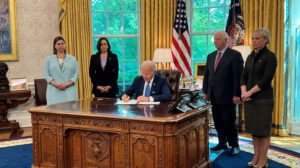
President of Ukraine Volodymyr Zelensky signed a law on the resumption of taxation of imports, including cars, from July 1, head of the parliamentary committee on finance, taxation and customs policy Danylo Hetmantsev said.
“Bill No. 7418 on the resumption of import taxes was signed by the President,” Hetmantsev wrote on Telegram on Thursday.

President of Ukraine Volodymyr Zelensky on Tuesday signed the law on ratification of the Istanbul Convention, adopted by Parliament on Monday.
“Signed! The Law on the ratification of the Istanbul Convention. Its main content is simple, but extremely important. This is an obligation to protect women from violence and various forms of discrimination,” the head of state wrote on Facebook on Tuesday.

President of Ukraine Volodymyr Zelensky signed law No. 2246-IX (previously bill No. 7264 on uninterrupted production and supply of agricultural products during martial law), adopted by the Verkhovna Rada as a whole on May 12.
The relevant information was published on the parliamentary website on Wednesday.
As reported, the Verkhovna Rada simplified the export, import and transit of agricultural products to Ukraine during martial law, which will expand farmers’ access to fertilizers and genetic material of farm animals, as well as support the Ukrainian organic industry.
“The task of the state is to simplify farming under martial law as much as possible and reduce the bureaucratic burden on business and government bodies. This applies, in particular, to the state registration of pesticides and agrochemicals, which is extremely important during the spring sowing campaign in 2022. Also it is important to support niche sectors of agriculture and organic production,” the explanatory note to the document states.
Law No. 2246-IX abolishes until the end of martial law and for 90 days after its cancellation the state registration of agrochemicals imported into Ukraine, including some types of nitrogen fertilizers, ammonium nitrates, ammonia in aqueous solution, thiosulfates, potassium, calcium and aluminum phosphates, borates, chelate zinc and a number of other mineral fertilizers.
In addition to the simplified import of such types of fertilizers, the bill cancels the state registration procedure for their production, sale, use and advertising.
The law also allows producers of organic products to use the label “organic”, “biodynamic”, “biological”, “ecological”, “organic” until July 1, 2024, even if they are not operators of organic products in accordance with law 2496-VIII on turnover organic products.
This initiative allows Ukrainian producers of organic products that were producing according to EU standards, but did not meet the status of an operator of organic products according to Ukrainian standards, to switch to Ukrainian production standards without an additional transition period. It also allows them to qualify for government support.
The document expands the list of entities that can take samples and conduct phytosanitary examination, in particular, introduces until the end of martial law and by 90 after its cancellation a simplified procedure for involving employees of private laboratories in the examination, and also authorizes agronomists-inspectors to conduct such inspections to conduct an audit on certification.
In addition, Law No. 2246-IX allows the import to Ukraine of cargoes with live animals in transit through countries where there are cases of disease from the list of the International Epizootic Bureau (OIE). This will allow the Ukrainian livestock industry to access modern breeding genetic material from the EU countries and expand the diversity of breeding material of agricultural animals in Ukraine.
ANIMALS, FERTILIZERS, IMPORT, LAW, PHYTOSANITARY CERTIFICATES

On Monday, May 9, US President Joseph Biden signed Law S. 3522 “The Lend-Lease Act for the Defense of Democracy in Ukraine of 2022”.
White House spokeswoman Angela Perez announced this on Twitter.
The description of the document on the website of Congress says that this law will give the US administration the right to provide military equipment to Ukraine and other countries of Eastern Europe during the 2023 fiscal year.
The bill was previously passed in the Senate and the US House of Representatives.

On Monday, May 9, US President Joseph Biden intends to sign law S. 3522 “Lend-Lease Act in Defense of Democracy in Ukraine of 2022,” according to Biden’s public schedule for Monday.
As noted, the signing will take place at 14.45 (21.45 Kyiv time).

On Thursday evening, the US House of Representatives adopted a law on lend-lease and the protection of democracy in Ukraine, head of the Office of the President of Ukraine Andriy Yermak said.
“Lend-lease for Ukraine has finally been opened. The law has been voted on. Thanks to our allies,” Yermak wrote on his Telegram channel on Thursday evening.
The text of the document refers to granting the US President expanded powers to transfer or lease defense assets to Ukraine to “protect the civilian population from Russian military invasion” and for other purposes.
“After the adoption of the act, the chairman of the White House is obliged within 60 days to establish accelerated procedures for the delivery of products. The Lend-Lease Act allows us to significantly speed up the supply of weapons, transport, food and aid from the United States. And all this will allow us to drive the Russian army out of our territories” , – wrote the head of the OP.
He noted that Lend-Lease “means the US confidence in Ukraine’s victory over Russia.”
“This will be an important victory for our indestructible people, who were able to unite the civilized world around them in the fight against the Russian evil,” Yermak summed up.
CONGRESS, LAW, LEND-LEASE, US